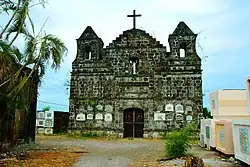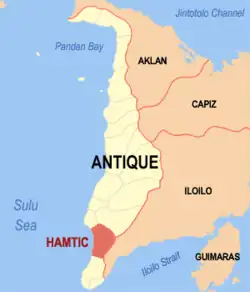Hamtic
Hamtic, officially the Municipality of Hamtic, (Kinaray-a: Banwa kang Hamtic; Hiligaynon: Banwa sang Hamtic; Tagalog: Bayan ng Hamtic), is a 3rd class municipality in the province of Antique, Philippines. According to the 2020 census, it has a population of 52,685 people.[3] Making it third most populous municipality in the province of Antique.
Hamtic
Antiqué, Antique | |
|---|---|
| Municipality of Hamtic | |
 Hamtic Cemetery Chapel | |
 Flag | |
| Etymology: Fire ant | |
 Map of Antique with Hamtic highlighted | |
OpenStreetMap | |
.svg.png.webp) Hamtic Location within the Philippines | |
| Coordinates: 10°42′N 121°59′E | |
| Country | Philippines |
| Region | Western Visayas |
| Province | Antique |
| District | Lone district |
| Chartered | January 20, 1954 |
| Barangays | 47 (see Barangays) |
| Government | |
| • Type | Sangguniang Bayan |
| • Mayor | Julius D. Pacificador |
| • Vice Mayor | Julius Ronald L. Pacificador |
| • Representative | Loren Legarda |
| • Municipal Council | Members |
| • Electorate | 30,483 voters (2022) |
| Area | |
| • Total | 113.03 km2 (43.64 sq mi) |
| Highest elevation (Mount Junes) | 542 m (1,778 ft) |
| Lowest elevation | 0 m (0 ft) |
| Population (2020 census)[3] | |
| • Total | 52,685 |
| • Density | 470/km2 (1,200/sq mi) |
| • Households | 12,419 |
| Economy | |
| • Income class | 3rd municipal income class |
| • Poverty incidence | 18.45 |
| • Revenue | ₱ 158.9 million (2020) |
| • Assets | ₱ 424.2 million (2020) |
| • Expenditure | ₱ 152.9 million (2020) |
| • Liabilities | ₱ 180.2 million (2020) |
| Service provider | |
| • Electricity | Antique Electric Cooperative (ANTECO) |
| Time zone | UTC+8 (PST) |
| ZIP code | 5715 |
| PSGC | |
| IDD : area code | +63 (0)36 |
| Native languages | Karay-a Ati Hiligaynon Tagalog |
Hamtic was formerly named Antique, after which the province was named. It is the oldest town and the first capital of the province before it was transferred to San Jose de Buenavista in 1802. The town speaks three dialects, namely Hamtikanon (a unique town dialect), Karay-a (the lingua franca of Antique province), and Hiligaynon (the regional dialect).[5]
“Hantik” was named after the humming big black ants that produce the sound “tik” when they bite.
History
Hamtic was created from portions of San Jose de Buenavista, through Executive Order No. 3 signed by President Ramon Magsaysay on January 5, 1954.[6]
Geography
Hamtic is 7 kilometers (4.3 mi) from the provincial capital, San Jose de Buenavista.
According to the Philippine Statistics Authority, the municipality has a land area of 113.03 square kilometres (43.64 sq mi) [7] constituting 4.14% of the 2,729.17-square-kilometre- (1,053.74 sq mi) total area of Antique.
Climate
| Climate data for Hamtic, Antique | |||||||||||||
|---|---|---|---|---|---|---|---|---|---|---|---|---|---|
| Month | Jan | Feb | Mar | Apr | May | Jun | Jul | Aug | Sep | Oct | Nov | Dec | Year |
| Average high °C (°F) | 30 (86) |
31 (88) |
32 (90) |
33 (91) |
32 (90) |
30 (86) |
29 (84) |
29 (84) |
29 (84) |
29 (84) |
30 (86) |
30 (86) |
30 (87) |
| Average low °C (°F) | 21 (70) |
21 (70) |
22 (72) |
23 (73) |
25 (77) |
25 (77) |
25 (77) |
25 (77) |
24 (75) |
24 (75) |
23 (73) |
22 (72) |
23 (74) |
| Average precipitation mm (inches) | 19 (0.7) |
17 (0.7) |
26 (1.0) |
37 (1.5) |
119 (4.7) |
191 (7.5) |
258 (10.2) |
260 (10.2) |
248 (9.8) |
196 (7.7) |
97 (3.8) |
39 (1.5) |
1,507 (59.3) |
| Average rainy days | 7.2 | 5.2 | 8.3 | 11.9 | 22.3 | 26.5 | 28.3 | 28.2 | 27.3 | 26.4 | 18.7 | 11.8 | 222.1 |
| Source: Meteoblue (modeled/calculated data, not measured locally)[8] | |||||||||||||
Barangays
Hamtic is politically subdivided into 47 barangays.[9] Each barangay consists of puroks and some have sitios.
| PSGC | Barangay | Population | ±% p.a. | |||
|---|---|---|---|---|---|---|
| 2020[3] | 2010[10] | |||||
| 060608001 | Apdo | 1.6% | 818 | 798 | 0.25% | |
| 060608002 | Asluman | 4.4% | 2,296 | 2,041 | 1.18% | |
| 060608003 | Banawon | 2.0% | 1,069 | 1,043 | 0.25% | |
| 060608005 | Bia-an | 2.1% | 1,089 | 1,087 | 0.02% | |
| 060608006 | Bongbongan I-II | 1.5% | 764 | 790 | −0.33% | |
| 060608008 | Bongbongan III | 0.9% | 475 | 425 | 1.12% | |
| 060608009 | Botbot | 0.9% | 449 | 392 | 1.37% | |
| 060608010 | Budbudan | 2.0% | 1,076 | 873 | 2.11% | |
| 060608011 | Buhang | 4.1% | 2,159 | 1,960 | 0.97% | |
| 060608012 | Calacja I | 1.7% | 878 | 827 | 0.60% | |
| 060608013 | Calacja II | 1.7% | 904 | 873 | 0.35% | |
| 060608014 | Calala | 1.5% | 802 | 769 | 0.42% | |
| 060608015 | Cantulan | 0.3% | 180 | 194 | −0.75% | |
| 060608016 | Caridad | 3.9% | 2,043 | 1,940 | 0.52% | |
| 060608017 | Caromangay | 1.2% | 627 | 622 | 0.08% | |
| 060608018 | Casalngan | 1.2% | 613 | 589 | 0.40% | |
| 060608019 | Dangcalan | 0.8% | 398 | 348 | 1.35% | |
| 060608020 | Del Pilar | 0.5% | 277 | 326 | −1.62% | |
| 060608021 | Fabrica | 1.3% | 688 | 678 | 0.15% | |
| 060608022 | Funda | 4.4% | 2,298 | 2,141 | 0.71% | |
| 060608023 | General Fullon (Tina) | 1.3% | 703 | 672 | 0.45% | |
| 060608030 | Gov. Evelio B. Javier (Lanag) | 3.5% | 1,844 | 1,694 | 0.85% | |
| 060608024 | Guintas | 4.3% | 2,264 | 2,165 | 0.45% | |
| 060608025 | Igbical | 1.2% | 618 | 583 | 0.58% | |
| 060608026 | Igbucagay | 1.1% | 561 | 491 | 1.34% | |
| 060608027 | Inabasan | 1.5% | 787 | 762 | 0.32% | |
| 060608028 | Ingwan-Batangan | 1.9% | 989 | 964 | 0.26% | |
| 060608029 | La Paz | 3.8% | 2,000 | 1,791 | 1.11% | |
| 060608031 | Linaban | 2.9% | 1,538 | 1,414 | 0.84% | |
| 060608033 | Malandog | 3.7% | 1,959 | 1,941 | 0.09% | |
| 060608034 | Mapatag | 3.8% | 1,979 | 1,799 | 0.96% | |
| 060608035 | Masanag | 1.5% | 800 | 716 | 1.12% | |
| 060608036 | Nalihawan | 0.5% | 276 | 307 | −1.06% | |
| 060608037 | Pamandayan (Botbot) | 0.3% | 172 | 152 | 1.24% | |
| 060608038 | Pasu-Jungao | 0.3% | 151 | 157 | −0.39% | |
| 060608039 | Piape I | 2.7% | 1,442 | 1,331 | 0.80% | |
| 060608040 | Piape II | 1.2% | 612 | 608 | 0.07% | |
| 060608041 | Piape III | 2.1% | 1,101 | 1,411 | −2.45% | |
| 060608042 | Pili 1, 2, 3 | 0.6% | 337 | 336 | 0.03% | |
| 060608045 | Poblacion 1 | 1.8% | 964 | 953 | 0.11% | |
| 060608046 | Poblacion 2 | 1.7% | 887 | 862 | 0.29% | |
| 060608047 | Poblacion 3 | 1.2% | 658 | 607 | 0.81% | |
| 060608048 | Poblacion 4 | 1.9% | 1,020 | 1,011 | 0.09% | |
| 060608049 | Poblacion 5 | 3.2% | 1,680 | 1,590 | 0.55% | |
| 060608050 | Pu-ao | 2.0% | 1,040 | 980 | 0.60% | |
| 060608051 | Suloc | 0.2% | 117 | 115 | 0.17% | |
| 060608053 | Villavert-Jimenez | 4.2% | 2,190 | 1,855 | 1.67% | |
| Total | 52,685 | 45,983 | 1.37% | |||
Demographics
.jpg.webp)
| Year | Pop. | ±% p.a. |
|---|---|---|
| 1960 | 18,534 | — |
| 1970 | 22,987 | +2.17% |
| 1975 | 24,967 | +1.67% |
| 1980 | 28,526 | +2.70% |
| 1990 | 34,394 | +1.89% |
| 1995 | 36,167 | +0.95% |
| 2000 | 38,230 | +1.20% |
| 2007 | 42,375 | +1.43% |
| 2010 | 45,983 | +3.02% |
| 2015 | 48,592 | +1.06% |
| 2020 | 52,685 | +1.60% |
| Source: Philippine Statistics Authority[11][10][12][13] | ||
In the 2020 census, Hamtic had a population of 52,685.[3] The population density was 470 inhabitants per square kilometre (1,200/sq mi).
Economy
References
- Municipality of Hamtic | (DILG)
- "2015 Census of Population, Report No. 3 – Population, Land Area, and Population Density" (PDF). Philippine Statistics Authority. Quezon City, Philippines. August 2016. ISSN 0117-1453. Archived (PDF) from the original on May 25, 2021. Retrieved July 16, 2021.
- Census of Population (2020). "Region VI (Western Visayas)". Total Population by Province, City, Municipality and Barangay. Philippine Statistics Authority. Retrieved 8 July 2021.
- "PSA Releases the 2018 Municipal and City Level Poverty Estimates". Philippine Statistics Authority. 15 December 2021. Retrieved 22 January 2022.
- "Hamtic". Official Antique Website. 2012. Archived from the original on 19 August 2012. Retrieved 11 February 2013.
- "Executive Order No. 3, s. 1954". Official Gazette of the Republic of the Philippines. 5 January 1954. Archived from the original on May 19, 2018. Retrieved 31 January 2023.
- "Province: Antique". PSGC Interactive. Quezon City, Philippines: Philippine Statistics Authority. Retrieved 12 November 2016.
- "Hamtic: Average Temperatures and Rainfall". Meteoblue. Retrieved 1 May 2020.
- "Municipal: Hamtic". PSGC Interactive. Quezon City, Philippines: Philippine Statistics Authority. Retrieved 8 January 2016.
- Census of Population and Housing (2010). "Region VI (Western Visayas)" (PDF). Total Population by Province, City, Municipality and Barangay. National Statistics Office. Retrieved 29 June 2016.
- Census of Population (2015). "Region VI (Western Visayas)". Total Population by Province, City, Municipality and Barangay. Philippine Statistics Authority. Retrieved 20 June 2016.
- Censuses of Population (1903–2007). "Region VI (Western Visayas)". Table 1. Population Enumerated in Various Censuses by Province/Highly Urbanized City: 1903 to 2007. National Statistics Office.
- "Province of Antique". Municipality Population Data. Local Water Utilities Administration Research Division. Retrieved 17 December 2016.
- "Poverty incidence (PI):". Philippine Statistics Authority. Retrieved December 28, 2020.
- "Estimation of Local Poverty in the Philippines" (PDF). Philippine Statistics Authority. 29 November 2005.
- "2003 City and Municipal Level Poverty Estimates" (PDF). Philippine Statistics Authority. 23 March 2009.
- "City and Municipal Level Poverty Estimates; 2006 and 2009" (PDF). Philippine Statistics Authority. 3 August 2012.
- "2012 Municipal and City Level Poverty Estimates" (PDF). Philippine Statistics Authority. 31 May 2016.
- "Municipal and City Level Small Area Poverty Estimates; 2009, 2012 and 2015". Philippine Statistics Authority. 10 July 2019.
- "PSA Releases the 2018 Municipal and City Level Poverty Estimates". Philippine Statistics Authority. 15 December 2021. Retrieved 22 January 2022.